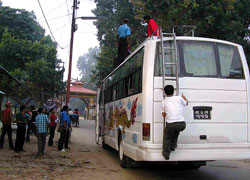|
|
The new Kathmandu-Delhi bus route is making monitoring trafficking more challenging than usual. It's also the newest way for women, egged on by manpower agents who dupe them, to try and illegally make their way to Kuwait.
In mid-September 15 young women from Rasuwa, Solukhumbu, Okhaldhunga, and Khotang were stopped at the Jamunaha checkpoint near Nepalganj. They said they were going to Kuwait via New Delhi.
These women were stopped when police and Maiti Nepal workers were conducting a regular check of public transport. Most of them, between 16 and 22, were turned over to their relatives, since they had neither the papers nor the finances necessary for their alleged journey to Kuwait.
Such women are considered high-risk for being sold, and in the last two months more than 100 women from Sindupalchok, Nuwakot, Banke, Rasuwa, Salyan, Jhapa, and Gorkha have been sent back from the border.
When the direct Kathmandu-Delhi bus route opened three months ago, more and more groups of women began crossing the border, and police sources say they stepped up vigilance at checkposts. Rita Bhattarai, coordinator of Maiti Nepal's Nepalganj office, says traffickers also make frequent use of the open border in Banke, Bardia, Kailali, and Kanchanpur.
Nepali women are not allowed to travel to Kuwait to work, except in the organised sector, yet manpower agents continue to offer them work as well-paid domestic help. Often this is a trap, and the women end up being trafficked in India.
Until now, women being trafficked crossed the border in rickshaws and horse carts, travelling alone or with a watcher, who often kept their distance. Groups of women on the buses now say they are out on a shopping expedition or, increasingly, that they are going to Kuwait.
Kuwait may not be as bad as Mumbai brothels, but it's far from ideal and women there legally have little recourse to help when in trouble. Maiti Nepal staff in Nepalganj say they've received eight complaints this year, one from a woman who was taken to Kuwait and sexually abused, and the rest from women who ended up in the brothels of Bombay instead of the jobs they were promised in Kuwait. "We managed to bring two women back from the brothels and are preparing to rescue more taken from Surkhet, Banke, and Dang," says Bhattarai.
The women stopped on 20 September were only carrying Rs 500 each, and none could say how they planned to fly without any money. "We didn't have to pay for the bus ticket or food," says Anjana Rai from Khotang, who was persuaded to come along by Akalmaya Sunuwar
from Okhaldhunga. Sunuwar claimed to have a relative in Kuwait who had told her to "get in touch with someone in Delhi who would take us to Kuwait", but was vague on details and unable to name the contact person.
All 15 women, most who hadn't even made it to SLC, were either very confused about their destination or had been told not to disclose any details. "It was clear that they would have never reached Kuwait and would instead end up in brothels in India," says Bhattarai.
Even if the group had reached Kuwait, chances are that they'd end up working as domestic help and possibly be sexually abused. On 28 September, Daya Gadtaula from Jhapa spoke to the press of how she and 13 other women in Kuwait were suffering under appalling conditions. It seems that no matter where these women go, their dreams of a better life are met with exploitation and misery.



